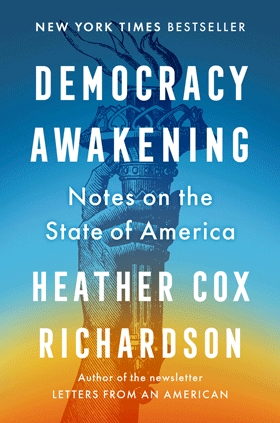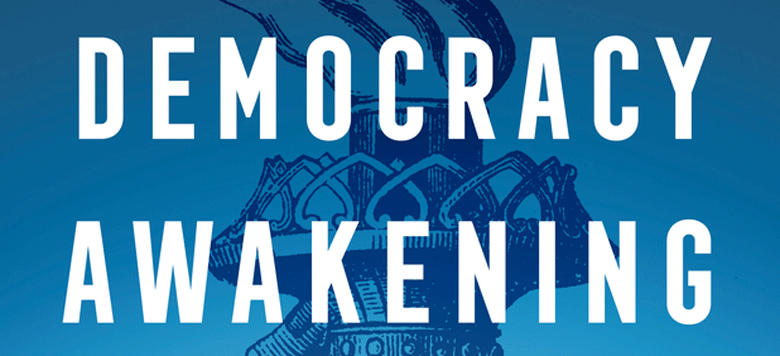Democracy Awakening: Notes on the State of America
By Heather Cox Richardson, Viking/Random House (2023)
Eventually, evil implodes.
This might be the only perennial history lesson Heather Cox Richardson omits to highlight in Democracy Awakening, her new book outlining the social and political history of the United States.
This corollary to Martin Luther King Jr.’s observation that “the arc of the moral universe is long, but it bends toward justice” may be missing because the best evidence of it on Richardson’s topic surfaced only after the book was published. In October 2023, the Republican Party demolished its own speaker of the House of Representatives and for three critical weeks could not agree on a replacement.
Democracy Awakening came out in August, but it provides the history that led to that implosion.
In Richardson’s reading, American history turns on the tension between two sociopolitical viewpoints: the belief that government should uphold equal rights for all, as expressed in the Declaration of Independence, and the belief that government should uphold a hierarchical social order in which a small number of men hold all of the power and most of the wealth.
In the former, the government fosters the rule of law and economic opportunity for everyone. Richardson identifies Abraham Lincoln as the first forceful proponent of this viewpoint, which evolved after the Civil War in the labor union movements of the late 19th century, the New Deal of the 1930s, and the civil rights movement of the 1950s and ’60s.
In the latter viewpoint, a small number of white men control government and society, fostering their own interests through adherence to Christian rules. Everyone occupies an inherent place in this order, from ruling families to farmers, to slaves, supposedly ensuring law and order, the development of high culture, and economic opportunity.
Richardson shows how in this scheme, economic opportunity seems always to fall upward and blacks, women, and poor people are viewed as subhuman.

Richardson’s narrative shows why the Jan. 6 insurrection was not a historical anomaly, but instead an almost inevitable outcome of the tensions that welled up in the 1840s as states’ rights debates. This led to the Civil War, in which the United States almost imploded over the signature issue for both sides—slavery.
After the war, states’ rights proponents cultivated the myth of the Plains cowboy as the great American hero in contrast to the “socialism” that in their worldview sought to undermine the rugged individual and unjustly transfer wealth from those who deserved it downward to those who had no right to it, especially inimically, to blacks.
By the turn of the century, the tensions between government for the people and government by hierarchic privilege led to serious labor turbulences, then to the Great Depression, from which developed the New Deal, in which government set out aggressively to level the economic and social playing fields.
After World War II, America made a clear turn to the “liberal consensus.” Such developments as large government investments in infrastructure and the Civil Rights Act exemplified how Lincoln’s vision for a government of, by, and for the people could work to everyone’s benefit.
A backlash to this, Richardson explains, took hold in the 1980s, when an upward transfer of wealth began that is today exacerbating social class stratifications and stoking efforts to dismantle American democracy through lies and corruption.
Richardson writes in terms general enough to make the book quick reading, but detailed enough to make the case. Democracy Awakening is based on her popular “Letters from an American” blog, which she began writing in 2019 to help put the troubled Trump years into historical context.
“You reap what you sow.” If ever we needed help from a reliable authority to understand how we got from the founding of the United States to the politics that are currently imploding the Republican Party and openly threatening to take the rest of us down with it, it’s now. This book provides it.
Richardson is a professor of American history at Boston College and lives in the Midcoast.
Dana Wilde is a former college professor and newspaper editor who lives in Troy.





